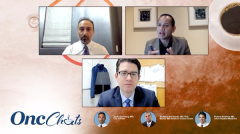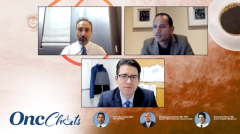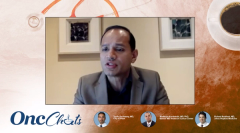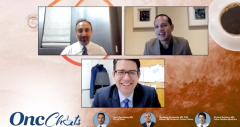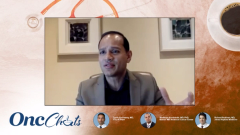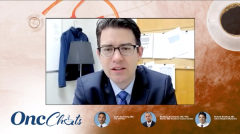
Taking Organoids From Bench to Bedside Through Endoscopy in Pancreatic Cancer: Patient-Derived Organoids
In this second episode of OncChats: Taking Organoids From Bench to Bedside Through Endoscopy in Pancreatic Cancer, Toufic A. Kachaamy, MD, Madappa Kundranda, MD, PhD, and Richard Burkhart, MD, provide an overview of patient-derived organoids and pharmacotyping in locally advanced pancreatic cancer.
Episodes in this series

In this second episode of OncChats: Taking Organoids From Bench to Bedside Through Endoscopy in Pancreatic Cancer, Toufic A. Kachaamy, MD, of City of Hope, Madappa Kundranda, MD, PhD, of Banner MD Anderson Cancer Center, and Richard Burkhart, MD, of Johns Hopkins Medicine, provide an overview of patient-derived organoids and pharmacotyping in locally advanced pancreatic cancer.
Kundranda: Switching gears to the topic on hand today: the discussion of organoids. Organoids have evolved over the past decade. We’ve made significant advances. However, this is one of those wherein we’re getting it from the bench to the bedside. [These developments are] still in the research realm and not standard of care in most institutions. For those of us who are less familiar with organoids, would you mind giving us this high-level, bird’s-eye view in terms of what exactly patient-derived organoids are as it pertains to locally advanced pancreatic cancer?
Burkhart: Yes, absolutely. That's a great question. I usually start answering that question with the concept of precision medicine, and what it means to really target or select therapies individually for each patient. As you know, in pancreas cancer, we have five standard drugs that we can use. We pair them in different ways and shapes and forms, but in reality, there are two combinations that we’ll use for patients. We have gemcitabine and nab-paclitaxel [Abraxane] together, and we have FOLFIRINOX, that is added together.
However, in the modern-day experience, oftentimes, the way we choose which [regimen] is best for each patient, is the medical oncologist flips a coin, or we rely on that old fashioned notion that if the chemotherapy is [comes with] more [toxicities], it must be more effective. FOLFIRINOX can sometimes be more toxic than gemcitabine and nab-paclitaxel, so the default sometimes is to [go with] the more toxic regimen. In reality, there are very little data to support that increasing toxicity, in and of itself, is associated with better clinical response. So clearly, for many diseases, not just pancreas cancer, we’re trying to move the needle over to individualize or personalize selection of therapies.
Historically, in pancreas cancer, we did that by studying the disease and looking for a genetic mutation or a protein that was abnormal. [We would] identify a protein and say, 'Perhaps this is the key to tell us whether this patient’s disease will respond to one chemotherapy [vs] another.' That’s honestly how I got my research start. I was looking into different proteins and different genetic mutations and trying to find one that would be the key that would tell me that something would respond better to gemcitabine, for example, rather than FOLFIRINOX. Unfortunately, through decades of research, that has not come to fruition. We still lack what we call a predictive biomarker of chemotherapeutic response.
As I started to look through the laboratory, and then look through the landscape of research advances, a next step [came very naturally to me]. If one singular protein or one singular DNA mutation can’t tell me what to do for a patient, perhaps I can try to recapitulate or grow a sample or example of a patient’s tumor outside the body. This is what an organoid is. A patient-derived organoid is created by sampling the patient’s own tumor. Whether it’s through endoscopy or surgery, you get a portion of the patient’s pancreatic cancer, you take it into a laboratory, and you use a special media to help grow those cells and recreate the patient’s tumor outside their own body. At the end of the day, as you’ve grown the patient’s tumor, you can then add drugs into that media, and you can test the patient’s tumor outside the body to see which drugs a patient may respond to best.
As such, the concept of patient-derived organoids and the way in which we foresee them being used in a precision medicine setting is, in fact, in sampling a patient’s tumor, growing it, and then testing it against chemotherapeutics. This is a concept called pharmacotyping, and there are several laboratories around the country that are becoming quite adept at it. As we move forward, the data for pharmacotyping and how it can serve as a predictive biomarker of chemotherapeutic response is getting stronger and stronger.
Check back next Thursday for the next episode in the series.
Register for the upcoming Advances and Innovations in Endoscopic Oncology and Multidisciplinary Gastrointestinal Cancer Care meeting:


